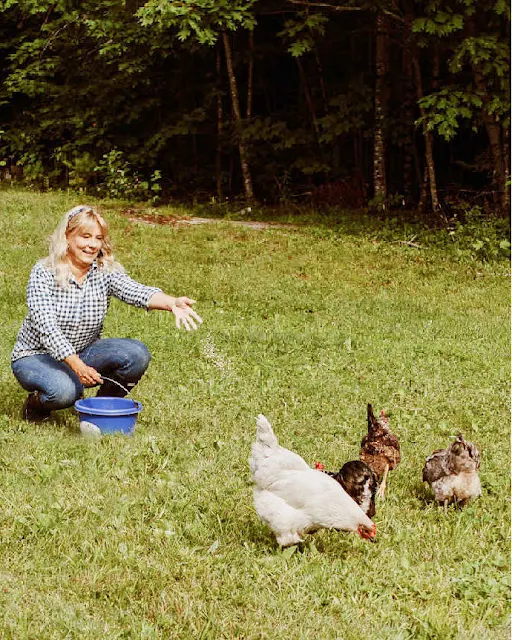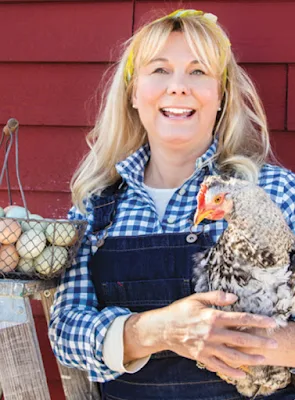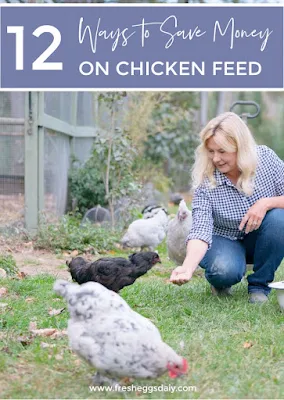12 Ways to Save Money on Chicken Feed
Backyard chickens need access to good-quality, balanced layer feed from sun up to sun down every day to ensure their good health and delicious, nutritious eggs. But there are ways to save money on chicken feed without compromising your flock's health.
Everybody works hard for their money, and now more than ever, finding ways to save money is important. Even though I do portion out about a half cup of feed per chicken/duck per day, I find that when I supplement my flock's diet with some nutritious additions, there's more feed left at the end of the day.
I do recommend providing a balanced commercial feed to your chickens every day regardless, at least in the morning, but you'll find that they don't eat as much of it if you use some of these tips.
And as long as the feed doesn't get wet and rodents or wild birds don't get into it, you can save it for another day.So here are twelve ways to save money on your chicken feed bill.
12 Ways to Save Money on Chicken Feed
Free Range
Probably the easiest (and least expensive) way to cut your chicken feed bill a bit is to let your chickens free range for at least part of the day. Chickens left to their own devices can get about 20% of their total daily energy needs from grass.
I like to let my chickens out for a few hours just before dusk - so they put themselves to bed on their own - to forage for grass, weeds, bugs and worms to eat.
Incredibly nutritious, these are things that chickens eat naturally and the more you are able to free range, the less commercial feed your chickens will require.
And if you can't free range, you can still give your chickens the benefits of free ranging by hand cutting weeds, edible flowers like violets and dandelions and grass and offering it to your chickens in their run.
Grow Grains or Seeds
Up the ante by growing some grains for your chickens. It's easy to till a small area and then grow cover crops like winter rye, wheat, sorghum, barley, millet, alfalfa, mustard or oats.
Or grow some corn, peas, sunflowers or other flock favorites.Your chickens will love rummaging through the field looking for the grains and seeds as well as noshing on the grasses.
If you have the space, get two areas going, and rotate them. Plant, grow, let the chickens in to eat (and fertilize) while you plant the second area.Once the second garden is ready, move the chickens over to that and replant the first garden area.
Growing Sunflowers for your Chickens.
Grow Fodder
If you don't feel comfortable letting your chickens free range, i.e. if you aren't home during the day or have major predator issues, then why not grow some fodder for your flock indoors?
Fodder is basically sod without the dirt. So you're growing mats of grass for your chickens to nibble on. You can sprout any type of untreated grass seed, or things like alfalfa or winter rye, right in a tray in your kitchen!
Sprout Seeds
Sprouting seeds is another way to reduce your feed bill. Seeds are inexpensive, and you can sprout not only things like mung beans, sunflower seeds or peas, but also any leftover garden seeds you didn't plant in a week or less.
Things like radish, broccoli, beet, carrot, cucumber or other vegetable seeds are super nutritious for your chickens - and they'll love them. Because they're packed with vitamins and minerals, your chickens will fill up on them pretty quickly, and they also help increase protein digestibility.
Grow a Chicken Herb Garden
Your chickens will love munching on all kinds of culinary herbs, all of which have some amazing health benefits and nutrients.
Various herbs provide vitamins, improve respiratory health, support the immune system, etc. and herbs don't take up much space and are easy to grow.
Share your Vegetable Garden
Your chickens will be more than happy to eat any bug-eaten or damaged vegetables, along with the stalks and leaves of such plants as peas, sweet potatoes, beets, radishes, broccoli and carrots.
Plant extra squash, pumpkins, cucumbers and leafy greens such as kale, Swiss chard and spinach for your chickens to fill up on. Be sure to share any thinned seedlings with your chickens as well. They'll love them!
In the fall, let your chickens into the garden to clean up any remaining produce not harvested, as well as munch on any bugs they can find.During the growing season, collect garden pests and other insects, along with earthworms for your chickens to eat. The protein is so good for them - and they'll help keep your lawn and garden pest-free!
Ferment Their Feed
Fermenting grains and seeds is another great way to save money on chicken feed. The act of fermenting produces enzymes that increase nutrient absorption, meaning your chickens will need to eat less fermented feed to get the same health benefits!
It only takes three days to ferment feed, and as an aside, whole or cracked grain works better than crumble or pellet.
Start a Kitchen Scrap Bucket
My grandmother always had a bowl she set next to the sink that she tossed all her kitchen scraps into. My mom did the same. And now I do as well. Chickens are omnivores, and with very few exceptions, can (and will!) eat all the trimmings, ends, tips and scraps, as well as leftovers from your kitchen.
Veggie peels and cores, as well as fruit peelings are obvious, but also the ends of bread, fish skins, fat trimmings from cuts of meat, and even shrimp shells are all absolutely appropriate to share with your chickens.
Bonus Tip: Ask for Grocery Store Discards
It's worth a try asking your local grocery store produce manager if you can have any wilted or bruised fruits and vegetables. Much of what isn't suitable for human consumption any longer is perfectly fine for animals. Anything that's not rotted or moldy is still fine for your chickens to eat.
I've scored split watermelons, expired bags of mixed salad greens and bruised peaches for my chickens just by asking.
Winter Scratch Grains
Scratch grains are basically candy for chickens. Yummy, high energy, not too nutritious. But in the winter, when your chickens have taken a break from laying eggs, you can relax a bit on their nutrition and supplement their feed with scratch grains in the afternoon before bed.
Scratch grains and cracked corn are considerably less expensive than commercial feed, so by replacing some of the feed in their diet with these grains, you'll save a little money in the winter months.
Bird Seed Mixes
One walk down the bird seed aisle will reveal that you can buy a BIG bag of mixed seeds and nuts for less money than you'll spend on a tiny bag of (likely less nutritious) chicken treats.
I buy large bags of wild bird seed for my chickens as a snack in the winter. They particularly enjoy the woodpecker mix that includes not only peanuts, pistachios, dried cranberries and sunflower seeds, but also an array of other seeds.
More nutritious than regular scratch grains, wild bird seed mixes can help cut your feed bill and keep your chickens warm by providing them a more nutritious snack before bedtime.
Black oil sunflower seeds are also fairly inexpensive in large bulk bags, or even better, grow your own sunflowers and harvest the seeds for your chickens (see above).
Eggs for Days
When you raise chickens, it's feast or famine. When eggs are plentiful, feed them back to your chickens (along with the shells of course!) to supplement their diet inexpensively.
You can scramble or hard cook the eggs then crush the shells over them for a fun (and super nutritious) treat for your chickens. Eggs are a great source of protein; the shells are a great source of calcium. In fact, an egg contains every nutrient needed for life except for Vitamin C.
Crushing Eggshells for your Chickens.
Raise Mealworms or Black Soldier Fly Larvae
If you're not squeamish about live squirmy bugs, raising your own mealworms or black soldier fly larvae is easy and inexpensive and you'll save a lot of money compared to buying commercial dried insects - plus yours will be alive!
Personally I don't have the stomach for that, but I will dig for earthworms in the compost pile for our chickens!
One Thing you Don't Want to Do!
I hope these tips are helpful to reducing your chicken feed bill. They all provide your flock with a varied, healthy diet that's very economical.
But I do have one caveat for you.
The funny thing about chickens is, they only eat until they have fulfilled their energy requirements for the day, so they'll end up eating far more of a low-quality feed to get what they need.
So you won't ultimately end up saving any money in the long run - and will most likely end up sacrificing something in the way of your flock's health and ultimately egg production instead.
Fresh Eggs Daily Natural Poultry Feed Supplements


































